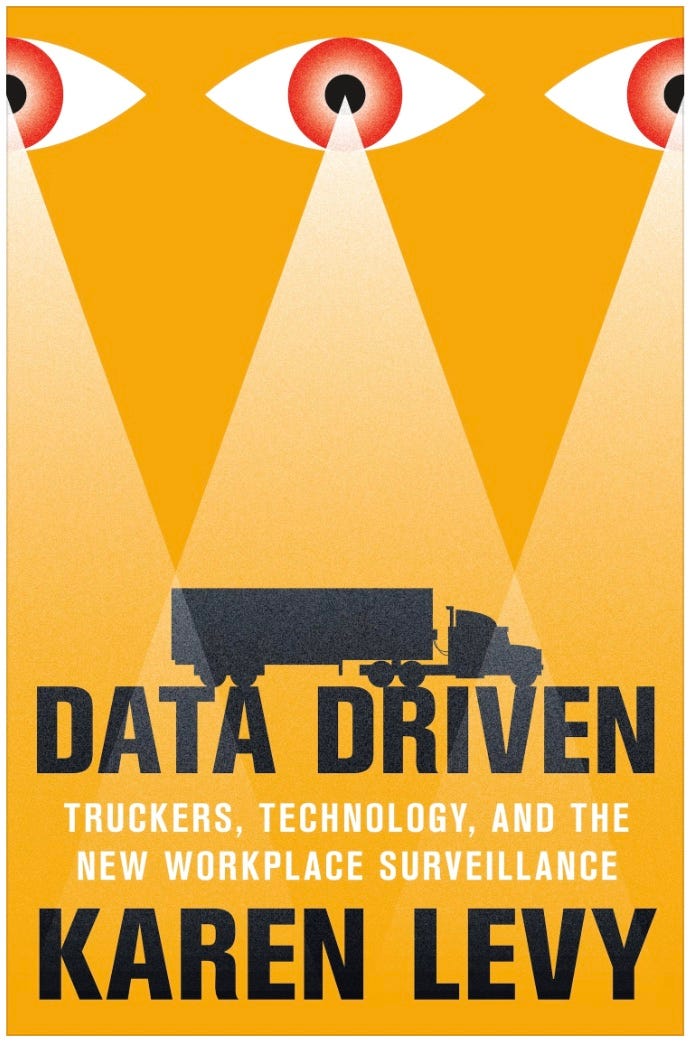Data Driven - Truckers, Technology, and the New Workplace Surveillance
My first stab at a book review.
Well, its finally here - I have mentioned this a few times over the past few months, and my editors over at American Affairs Journal finally let ‘er rip on Monday.
There was a delay in getting this out, in part because American Affairs liked it so much they decided to include it in their print edition, which meant delaying the online release.
I’m elated that they did so - this review is probably, to my mind, the finest piece of writing I have ever produced, and a fair enough critique of the book in question, though it is lavish with praise of Professor Levy’s work. And I believe that I am the first trucker to have a review of her book published in a major non-trucking media publication.
In a way, I am also “flipping the script” on the object of study becoming the student; perhaps I can explore this later, when Professor Levy appears on my podcast. Stay tuned for that!
Alright, here it is - Panopticons of The Interstate
Some pull quotes -
”Deregulation, in short, should not be confused with expanding trucker freedoms. On the contrary, truckers faced with increasing economic pressures have been met with the monitoring technologies examined in Data Driven.”
———
”When the ELD mandate was first being discussed, a selling point that the government and large fleets made to drivers was that all of the data collected would be used to solve other problems in the industry. These supposed benefits included having real-time data on detention at customer facilities, predicting traffic patterns, and locating new parking facilities, which have been, and increasingly are, difficult for drivers to come by. Of course, these were all falsehoods: truck parking, or lack thereof, is still a major concern for truckers, and truck detention times have only become worse; drivers are almost never compensated for these delays. In fact, detention delays are so bad that, on average, about 40 percent of America’s trucking capacity is being held up at customer facilities.2 One would think that the “interoperable” nature of surveillance technology, as described by Levy, might be used as advertised—for safety, for efficiency, and for other benefits—but as the experience of most truckers in America today proves, none of this is true.”
———
”In this same vein, Levy repeatedly references truckers’ “masculine self-conceptions,” and at one point feels compelled to clarify, in a footnote, “Readers may notice . . . I frequently refer to truckers using he/him pronouns. I do this in recognition of the heavily skewed demographic makeup of the trucking population as well as the centrality of masculinity to trucker culture.” Setting aside whether this note is an honest explanation of a cultural phenomenon, or a signaling device to her fellow academics that she hasn’t caught the dreaded “misogyny” by hanging out with truckers during her research, most of Levy’s book actually disproves that masculinity is central to anything about trucking anymore.”
———
Truckers have been on the leading edge of surveillance technology implementation in the workplace, and by leading edge, I mean being treated like lab rats. One would think labor advocates and unions would be fighting this tooth and nail, but as truckers are only 5 percent unionized, not many besides Levy are sounding the alarm: “there’s something viscerally offensive about the micromanagement enabled by these technologies. The privacy intrusions brought about by the introduction of the ELD pale in comparison.”
———
”The trends covered in Data Driven should give any worker cause for alarm: if they could get away with doing this to America’s 3.5 million truckers, they’re going to come for you, too. And “they” should also read this book and ask themselves: will turning our employees into serfs of surveillance bring about a smashing of the looms?”
Data Driven is a fantastic examination of the forces driving the ever growing surveillance paradigm which is slowly enveloping all of our waking lives, and serves as a warning not only to truckers and other workers, but to society as a whole, in what we stand to lose along the way to a supposed perfection of society, using technology to ‘guarantee’ such vacuous notions of ‘safety’ or ‘compliance’.
You can purchase your own copy of Data Driven at Princeton University Press and I highly recommend that you do so.
G





Great piece, Gord. This seems to be drive of the technical system at this point. Real technological gains through genuine innovation and few and far between these days. So the real impetus of the technical system is now showing itself: control. Everything must be monitored and controlled. As you mention in the piece, at some point things will go one step to far. This is what few understood about the Canadian trucker dispute, that while it was on the one hand about Covid, what gave it real energy was all the things detailed in this piece. What happens when this kind of energy builds across multiple sectors at once? A full Butlerian Jihad?